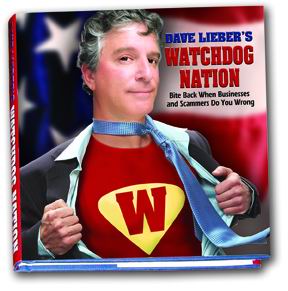An Arkansas company that collects information about us and then resells it to banks, retailers, insurance companies and others for a billion dollars a year in sales almost pulled a fast one on The Watchdog.
I was excited about the release of personal data by Acxiom on its free new website. I couldn’t wait to show you how to access your data so you can see what secrets a big-time data broker knows about you.
Great story: Your personal information released for the first time in history. What Big Brother keeps in his file.
As readers of The Dallas Morning News Dave Lieber Watchdog column first learned, then I studied why Acxiom did this. On the surface, the idea is that a watchdog columnist like me would brag on this new website. Wow. Cool. No corporate data broker ever did this before. How can you not respect Acxiom for being so transparent and revolutionary in the way it is suddenly treating us Americans?
You know, it almost worked.
A few things killed the positive vibe.
Turns out, Acxiom doesn’t have the purest of motives. Scott Howe, chief executive officer and president, has said in interviews that he wants his company to sit at the bargaining table when the federal government does what it so far has refused to do — set up regulations that show data brokers what they can do with information about us.
Hey, we’re open, the company’s message goes. We want you to see what we’re all about. “We are not going to get anywhere by hiding,” Howe told one reporter.
Oh really, sir? I went to the company’s new website — AboutTheData.com — and looked up my information. What I saw was a joke. This whole thing is a bogus public relations stunt. I’m not buying into it.
– – – – – – – – – – – – – – – – – – – – – – – –
More Watchdog Nation News:
Watchdog Nation Partners with Mike Holmes
America meets Watchdog Nation/Listen to Fun Radio Interview
Watchdog Nation Debuts New e-Book and Multi-CD Audio Book
– – – – – – – – – – – – – – – – – – – – – – – –
The company’s information about me is mostly accurate. Acxiom knows the value of my house, the age of my youngest son and even my approximate income. But it also says I’m “interested” in the following areas: gourmet cooking, crafts, decorating and gardening. My wife is LOL when she reads that. (Who wants a watchdog doing that anyway? If I’m gourmet-cooking, making crafts, decorating and gardening, when would I investigate your problems?)
The problem for me is not that they got most things right and a few things comically wrong. My concern is what’s not in my report. My watchdog associate, Marina Trahan Martinez, showed me her personal report. It included her preferred political party, her recent online purchases and her family vehicles. My report didn’t include any of that information.
But that’s not all that’s missing. From my reading, I learned that Acxiom most likely possesses other information that it’s hiding from me.
The company uses shorthand slogans to categorize households — such as “Frugal Families” and “McMansions and Minivans,” The New York Times reported. My family’s nickname is left out.
The paper reported that Acxiom also sells descriptive phrases to customers about us with words such as “gambling,” “senior needs,” “smoker” and “adult with wealthy parents.”
Forbes reported that the company knows “some health topics of interest to you” such as diabetes or arthritis.
Other companies in the data broker business are said to collect information about sexual orientation, criminal and civil court records, credit history, health records and bank information.
Acxiom’s public disclosure only amounts to a sanitized version of a Big Brother file. This exercise is a feat of hocus-pocus, turning a glass of strong bourbon into a cup of milk. There’s no bite, no real privacy invasion, no truth to this data dump when compared with the type of information the company actually keeps.
I’d love to run all these thoughts by company leaders. I’ve been trying for two months to talk to them.
In July, the corporate communications manager answered that he would get in touch with me later. Last week, a company spokeswoman told me everyone is too busy. (Must be! Acxiom laid off 20 employees last month from its marketing division at Little Rock headquarters.)
I showed the AboutTheData.com website to Suku Nair, chairman of the Department of Computer Science and Engineering at Southern Methodist University. He’s not impressed.
“The site is not very secure,” he said. He’s right. To get your information, you type in only your name, address, date of birth and last four digits of your Social Security number. Think about that. Information you give all the time to others to confirm your identity is all that’s needed to enter this website.
Much of his personal information wasn’t correct, Nair said. The site allows you to edit your information and even opt out of Acxiom sharing your information with others. After this stunt, I’d recommend going to the site only if you want to opt out. Otherwise, don’t bother.
Nair instructs that by visiting AboutTheData.com and giving your personal details to enter, you confirm the latest information about yourself. You’re doing their work for them.
AT A GLANCE: Protect yourself
Learn some of what Acxiom knows about you at AboutTheData.com. Opt out of information sharing. Edit your data.
Remember, you can get a free credit report from each of the three credit bureaus once a year at annualcreditreport.com.
Read privacy notices from companies and opt out of sharing.
Don’t answer surveys or fill out cards for drawings with personal information.
To get your name off mailing lists, visit dmachoice.org. Click on “Email Opt Out Service” and “Register for EDDM” to stop receiving certain kinds of commercial mail.
– – – – – – – – – – – – – – – – – – – – – – – –

Still here? Visit Dave Lieber’s other fun websites:
Personal: YankeeCowboy.com
Hipster site: DaveLieber.org









 \
\









